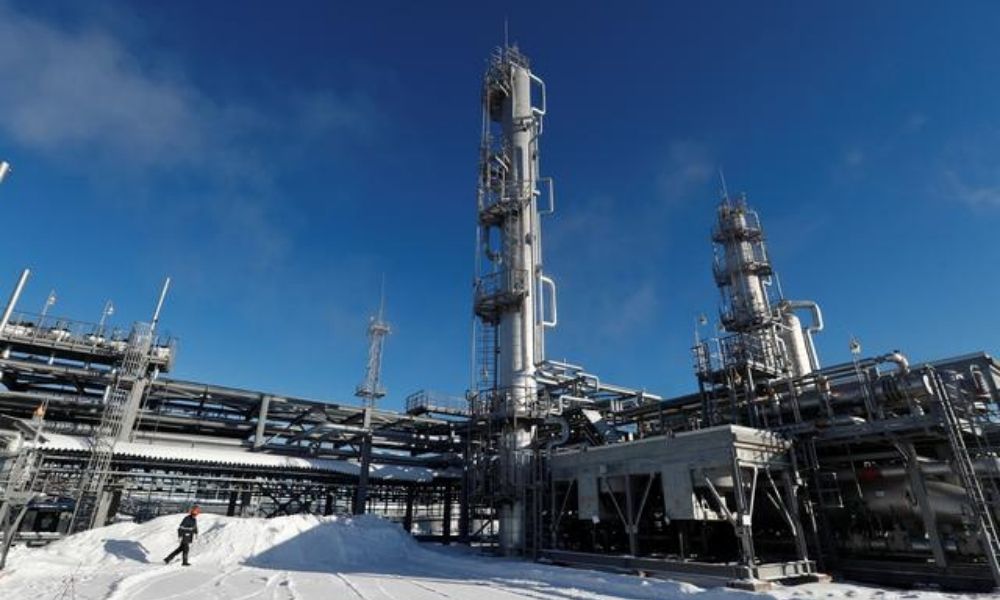
BEIJING (Reuters) Oil prices jumped on Friday by nearly 3% on concerns of global supply disruptions from the impact of trade sanctions on major crude and fuel exporter Russia after it invaded Ukraine.
Global benchmark Brent crude rose $2.81, or 2.8%, to $101.89 a barrel at 0738 GMT on Friday, after climbing to as high as $101.99.
U.S. West Texas Intermediate (WTI) crude touched a high of $95.64 a barrel and was last up $2.37, or 2.6%, at $95.18.
On Thursday, the start of the invasion in Ukraine caused prices to surge above $100 a barrel for the first time since 2014, with Brent touching $105, before paring gains by the close of trade.
The massed Russian assault by land, sea, and air was the most significant attack on a European state since World War Two, prompting tens of thousands of people to flee their homes.
"Asian buyers, clearly nervous into the weekend, have piled into oil today sending prices higher once again, helped along by reports of explosions in Kyiv," said Jeffrey Halley, senior market analyst at OANDA, referring to Ukraine's capital.
| Recent Article |
 Hot Topic: The Top 5 Crypto Trading Strategies. Hot Topic: The Top 5 Crypto Trading Strategies. |
 Exposed In 2022: What is the most accurate trading indicator? Exposed In 2022: What is the most accurate trading indicator? |
"The Ukraine situation will serve to keep prices elevated, as will the threat of disruptions, real or imagined, coming in an environment of already strong demand and constrained supply globally... I believe Brent crude will now trade in a $90-110 range over the next few weeks."
In response to the invasion, U.S. President Joe Biden hit Russia with a wave of sanctions on Thursday. These measures impede Russia's ability to do business in significant currencies along with sanctions against banks and state-owned enterprises.
Britain, Japan, Canada, Australia, and the European Union also unveiled more sanctions on Moscow, including a move by Germany to halt an $11 billion gas pipeline from Russia.
However, Russia will not have its oil and gas flows targeted explicitly by sanctions, a U.S. official said. The country is the world's second-largest crude producer and a primary natural gas provider to Europe.
"Oil markets are particularly vulnerable to supply shocks given global oil stockpiles are at seven-year lows," said Commonwealth Bank analyst Vivek Dhar in a note.
"OPEC+ spare oil capacity has come under question due to disappointing OPEC+ supply growth," Dhar wrote, referring to the Organization of the Petroleum Exporting Countries (OPEC) and allied producers, including Russia, and problems they have experienced in boosting production. According to a Reuters survey, output by OPEC members in January was below a rise planned under a deal with allies.
While the Biden administration has indicated it may look to release strategic oil stockpiles to address high prices, "history suggests that any drawdown on strategic oil stockpiles will likely only provide temporary relief from high oil prices," added Dhar.
Nigeria's petroleum minister has also said that there is no need for OPEC+ to expand planned oil production as a potential deal between Iran and world powers will increase supplies.
The U.S. and Iran have been engaged in indirect nuclear talks in Vienna that could remove sanctions on Iranian oil sales and increase global supply if a deal on Iran's nuclear program is reached.
On Thursday, Iranian officials said on Twitter (NYSE: TWTR) that Western partners in the nuclear talks have to make decisions on crucial issues to help reach an agreement.